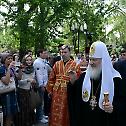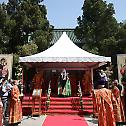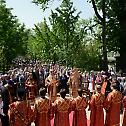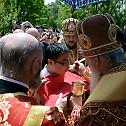Patriarch Kirill celebrates Divine Liturgy in Beijing
On May 12, 2013, the second Sunday after Pascha, His Holiness Patriarch Kirill of Moscow and All Russia celebrated the Divine Liturgy in the territory of the Embassy of the Russian Federation in Beijing in which the Russian Orthodox Mission in China used to be.
The Primate of the Russian Church was assisted by Metropolitan Hilarion of Volokolamsk, head of the Moscow Patriarchate’s department for external church relations, Bishop Sergiy of Solnechnogorsk, head of the Moscow Patriarchate’s administrative secretariat, Archpriest Nikolay Balashov, DECR vice-chairman, Archpriest Aleksiy Kiselev, dean of the Orthodox community in Shanghai, Rev. Sergiy Voronin, rector of the church of the Assumption of the Russian Embassy in Beijing, and Rev. Ilia Kosykh, acting head of the DECR communication service.
Among the worshippers were Russian Ambassador to China A. Denisov, Minister-Counsellor of the Russian Embassy Ye. Tomikhin, the Russian Embassy’s first secretary A. Povalyaev, as well as Russian and foreign diplomats. There were also V. Legoida, head of the Synodal Information Department, Russian-speaking expatriates living in China, Orthodox believers in China and other countries.
In his Primatial address to the congregation, His Holiness Patriarch Kirill greeted them with the Paschal exclamation and speaking about St. Thomas, who is commemorated on this day, said in particular,
‘What happened in Thomas’s soul has happened today and throughout history to very many people. We often read the Gospel and other books about Christ and his miracles and his life. We are amazed at the Gospel’s depth of thoughts and power of its moral message. But for very many it remains an insufficient testimony and while recognizing the value of Christianity as an ethical system, people remain non-believers. It happens because they have not encountered Christ, have failed to see his face and to feel his real presence.
And how can one encounter Christ? It is to feel, at some moment in your life, the hand of God lying on you, and what happens to you falls out of the life logic and gives an idea of a different world with which you have come in touch. It happens to very many people in this life, regardless of external conditions.
External conditions can be very unfavourable for one’s coming to believe in Christ. Nevertheless, meeting with the Lord, they find steadfast faith. It is not in the 90s that religious revival began in our country. It began in the terrible years of the Great Patriotic War when everybody, both generals and soldiers, turned to God, when our very victory over the enemy, who exceeded us in power many times over, appeared to be God’s intervention in our life. Overcrowded churches in the post-war years in our country were a testimony of people’s personal encounter with God…
It is a real religious experience, the one that Thomas had when he met with our Saviour. He confessed Christ as Risen God and his Saviour. From this meeting he received such a powerful spiritual impulse that made him take the path of preaching Christ, which led him to as far as India and China.
Thomas was the first to preach the Risen Christ in this land. This land saw the one who had seen the Risen Christ, and the tradition about it is still kept in the Chinese land.
Over three hundred years ago, Russian people, the Albazin Cossacks, appeared in this very place. They, together with their priest, were taken prisoner and brought to Beijing and settled on the very spot we are standing on. Nobody prevented our ancestors from praying and confessing our Lord and Saviour. Very soon the Albazin Cossacks married Chinese women. Their posterity got married to Chinese men and women, and today the Albazians are children of the Chinese people who keep the Orthodox faith in their hearts.
With a special feeling I greet the descendants of the Albazians and all the Orthodox Chinese who worshipped together with us.
In the early 18th century, a Russian Orthodox Mission was founded at the place where the Albazians lived. And great China came to know Russia through the Russian Orthodox Church. Neither Russians nor Chinese should forget that the first contact between the two nations happened in the very place where we have celebrated the liturgy today. Throughout the subsequent years, the Russian Orthodox Church was aware of her special responsibility for the relations between the two countries and peoples. Perhaps the fact that Russia was represented in China by the Russian Orthodox Mission explains the peaceful presence of our country in China with its great respect for the Chinese people and Chinese culture.
The preaching carried out by the Russian Orthodox Mission was successful, and in the last century 50s, two Chinese were ordained bishops and many Chinese were ordained priests. In 1956, Chinese Orthodoxy was declared by the Chinese Autonomous Orthodox Church. It was a special date in the history of Chinese Orthodoxy.
The subsequent history was complicated both for China and Russia. We know that the Church suffered in Russia and she suffered in China, too.
Now, new times have come. By God’s mercy, the Patriarch of Moscow has had an opportunity to set foot on the Chinese land and to celebrate the Divine Liturgy at the very place where the Russian Orthodox Mission used to work and where the Russian Embassy carries out its lofty mission.
I have come here in the first place to see you all and to pray together with you. I have also met with the leaders of the country to discuss the Russian-Chinese relations and the life of the Chinese Orthodox Church.
I would like to wholeheartedly wish China and the Chinese people peace, well-being and prosperity. I am confident that the participation of the Russian Orthodox Church in the Russian-Chinese relations will promote the cordiality of these relations, their sincerity and genuine friendship. Certainly, it will be helped by the historical fact of the existence of the Chinese Orthodox Church, which we consider to be the spiritual bridge uniting our peoples’.
Patriarch Kirill said that during the service prayers were lifted up for the victims of the flood which hit China: ‘Hundreds of thousands of people were affected by this disaster and lost their homes. Roads and bridges were ruined, fields bringing food were destroyed. We prayed that the Lord may show his mercy for the Chinese people and bring an early healing of these wounds’.
Patriarch Kirill also thanked the Russian Ambassador A. Denisov, saying, ‘In the remote year of 1993, during my first visit to China, we inspected the territory of what was the Russian Orthodox Mission and what is the Russian Embassy today and came in the garage arranged in the church of the Assumption. Already at that time we thought about the need to restore this shrine in the territory of the embassy. Both Russians and Chinese covered a long way to lead to the consecration of the church of the Assumption and my today’s visit to the Celestial Empire’.
Patriarch Kirill presented the church of the Assumption with liturgical vessels. Every worshipper received as a token a small icon of the Risen Christ.
After the service, Patriarch Kirill and Ambassador Denisov made a tour of the embassy territory in which the Russian Orthodox Mission used to be and made a stop at the cross erected on May 4, 1997, in the Upper Garden to commemorate all the Orthodox people ‘who died and were buried in this country’.
Source: mospat.ru





